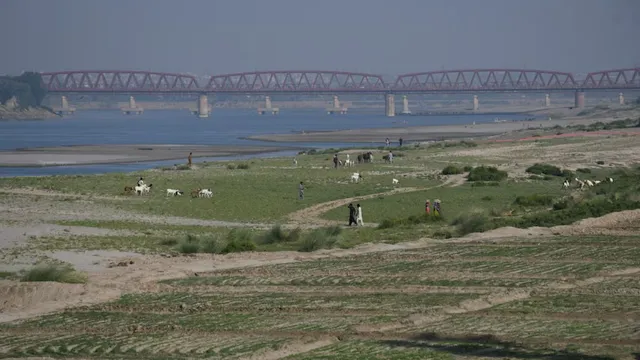- By Ajeet Kumar
- Tue, 06 May 2025 03:03 PM (IST)
- Source:JND
A week after India suspended the Indus Waters Treaty for Pakistan, the water level of the Chenab River is reportedly lowered significantly. According to a report by Dawn, Water flows in the Chenab, recorded at the Marala headworks, decreased from up to 35,000 cusecs on Sunday to about 3,100 cusecs on Monday morning.
"They have almost blocked the River Chenab flows to downstream (Pakistan) after they (Indian authorities) took the decision on Sunday," Dawn quoted a senior official of the Punjab irrigation department.
"Currently, they are using our water to fill up their dams/hydropower projects in the Chenab basin. They cannot do this since it is a grave violation of the Indus Water Treaty…," added the official.
India's Hyropower Projects In Chenab Basin
Notably, India has three hydropower projects in the Chenab Basin-- the Pakal Dul Dam, the Baglihar Dam and the Salal Dam. The official claimed that if the situation continues, Pakistan would face a drought-like situation in the next four to five days. When asked about the situation, if India releases water, the official noted that Pakistan's major cities would face a flood-like situation.
#WATCH | J&K | Some amount of water continues to flow out of the Baglihar Hydroelectric Power Project Dam built on the Chenab River in Ramban. All gates of the dam remain closed. pic.twitter.com/UO03tgWMI9
— ANI (@ANI) May 6, 2025
"From Salal Dam, Marala Barrage (in Pakistan) is situated 76km away. The reason behind the massive reduction in the flows is the filling of these dams, which have a total storage capacity of over 1.2 million acre-feet. And if they keep filling their dams and avert discharging, they (India) may leave us without water for four to five days more," the official warned.
The official underscored that Chenab is very important for Pakistan’s irrigation system, as its canals, including the UCC and BRB canals, irrigate a vast tract of agricultural land in Punjab.
India Suspends Indus Waters Treaty:
India's decision to suspend the decades-old treaty follows the killing of 26 people, mostly tourists, in a terror attack in Jammu and Kashmir's Pahalgam on April 22. Signed in 1960, the treaty allocates the eastern rivers — Sutlej, Beas and Ravi — to India and the western rivers — Indus, Jhelum and Chenab — to Pakistan.
Notably, the treaty includes no clause allowing unilateral suspension. Pakistan’s economy, already under strain, could face further stress as agriculture contributes 22.7 per cent to its GDP and employs 37.4 per cent of the workforce, according to its 2022-23 Economic Survey.

